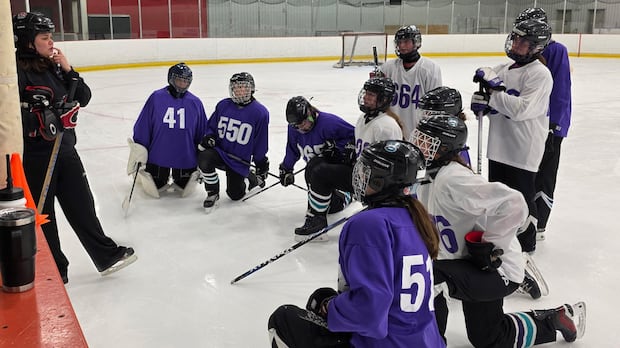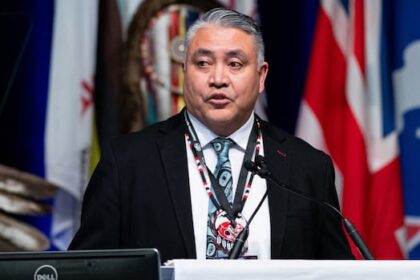OttawaMinor hockey and ringette associations spend the bulk of their budgets on renting ice time. But with only so many arenas in the city and a growing interest in girls’ ice sports, divvying up that ice time isn’t always easy. So when longtime ringette coach Dave McWaters comes across an empty ice rink during peak hours, he gets a little frustrated. Ottawa coach, Dave McWaters, runs a social media account that matches ‘burnt ice’ with teams lookingRebecca Zandbergen · CBC News · Posted: Nov 03, 2025 4:00 AM EST | Last Updated: 2 hours agoListen to this articleEstimated 4 minutesCoach Leah McWaters talks to her team of ringette players in Ottawa (Submitted by Dave McWaters)Minor hockey and ringette associations spend the bulk of their budgets renting rinks, but with only so many arenas in Ottawa and a growing interest in girls’ ice sports, divvying up that ice time isn’t always easy.So when longtime hockey and ringette coach Dave McWaters comes across an empty rink during peak hours, he gets a little frustrated.”For several years I’ve noticed that there’s ice empty at prime time, during the day on a Saturday and Sunday,” McWaters said. We’ve never been able to really keep up with the demand as sports grow, especially girls hockey and ringette is actually growing.- Dave McWaters, longtime coachEach spring, sports associations are required to submit their ice requests to the City of Ottawa. Before tax, the hourly rate runs between about $205 and $342. After some back and forth, the city finalizes the schedule. Any changes after that are subject to a cancellation fee.Sports associations spend thousands of dollars on ice time. For instance, the City of Ottawa Ringette Association (CORA) — which is not affiliated with the city — says it spent $330,000 last year renting ice for its 30 teams and 450 players.Dave McWaters, 56, has been coaching since he was 16 years old (Rebecca Zandbergen/CBC News)Reselling ice time on social mediaAbout a year and a half ago, McWaters started a Facebook group called Ottawa Area Ice Exchange, where he encourages teams to post any pre-paid ice they can no longer use. “They can resell it at the cost that they bought it at, or at a discounted price if necessary,” McWaters said. “The city does allow them to transfer their contract over for that hour so the city knows who’s on the ice [and that] the proper insurance is in place.”(For its part, the city is aware of the Facebook page and says any ice exchange must be routed through its own central allocation system.)There are lots of reasons why a team might give up ice time — for example, if they’re playing in a tournament out of town. And as the season goes on, the problem of “burnt ice,” as it’s often called, gets worse.“Teams are out of the playoffs, but they’ve already bought ice,” McWaters said. “They have extra ice that is not going to be used because their season is just over.”According to the city, staff at each arena track and report burnt ice. “When a pattern of underused ice is identified, staff follow up directly with the group to address the issue and encourage efficient use of allocated time,” said Dan Chenier, the city’s general manager of recreation, cultural and facility services. That “helps maintain fairness, accountability, and optimal use of public facilities,” he said. The city also provides a limited amount of “last-minute ice” available at a discounted rate.Dave McWaters posted this photo from the Jim Durrell Recreation Centre on Walkley Road last month (Facebook)Booking ice is ‘educated guesswork’But figuring out how much ice to buy before the season begins — and before players have signed up — is tricky.“It’s a bit of educated guesswork,” said CORA scheduler Mike Tjetkema, whose 14-year-old daughter plays ringette. “I am trying to give people one or two practices a week. I want to have spacing between the practices. I want to practice before a game.”What’s more, there are also more girls are playing ringette and hockey these days.According to Hockey Canada, the 2024-2025 season was a record-setting one for participation in women’s and girls’ hockey. More than 115,000 players registered, the highest number in Canadian history.“We’ve never been able to really keep up with the demand as sports grow, especially girls’ hockey and ringette,” said McWaters.Finally, aging ice rinks have also made it challenging to properly book ice.“We have a lot of single, older rinks,” McWaters said. “And they tend to have mechanical issues and issues where the ice may go down.”ABOUT THE AUTHORRebecca Zandbergen is from Ottawa and has worked for CBC Radio across the country for more than 20 years, including stops in Iqaluit, Halifax, Windsor and Kelowna. Most recently she hosted the morning show at CBC London. Contact Rebecca at rebecca.zandbergen@cbc.ca or follow @rebeccazandberg on Twitter.
Wednesday, 4 Feb 2026
Canada – The Illusion
Search
Have an existing account?
Sign In
© 2022 Foxiz News Network. Ruby Design Company. All Rights Reserved.
You May also Like
- More News:
- history
- Standing Bear Network
- John Gonzalez
- ᐊᔭᐦᑊ ayahp — It happened
- Creation
- Beneath the Water
- Olympic gold medal
- Jim Thorpe
- type O blood
- the bringer of life
- Raven
- Wás’agi
- NoiseCat
- 'Sugarcane'
- The rivers still sing
- ᑲᓂᐸᐏᐟ ᒪᐢᑿ
- ᐅᑳᐤ okâw — We remember
- ᐊᓂᓈᐯᐃᐧᐣ aninâpêwin — Truth
- This is what it means to be human.
- Nokoma











